#overwork
Text
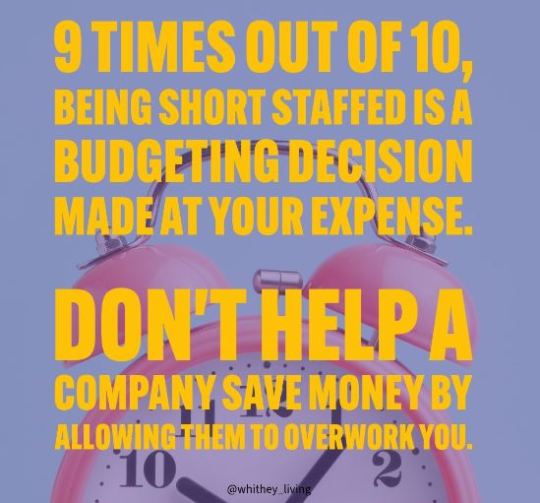
478 notes
·
View notes
Text
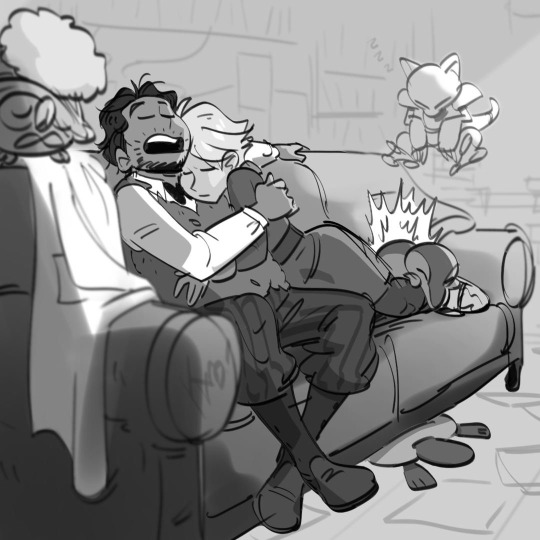
One too many late nights at work 😴
#pokemon legends arceus#surveyshipping#rowlett#oshawott#cyndaquil#abra#professor laventon#captain cyllene#pla#oh you thought I was done huh????#i got a few more in me yet lol#also your only two options are hat or hat hair nothing else#comfort ship#napping#overwork#taking a break#sbpro
630 notes
·
View notes
Text
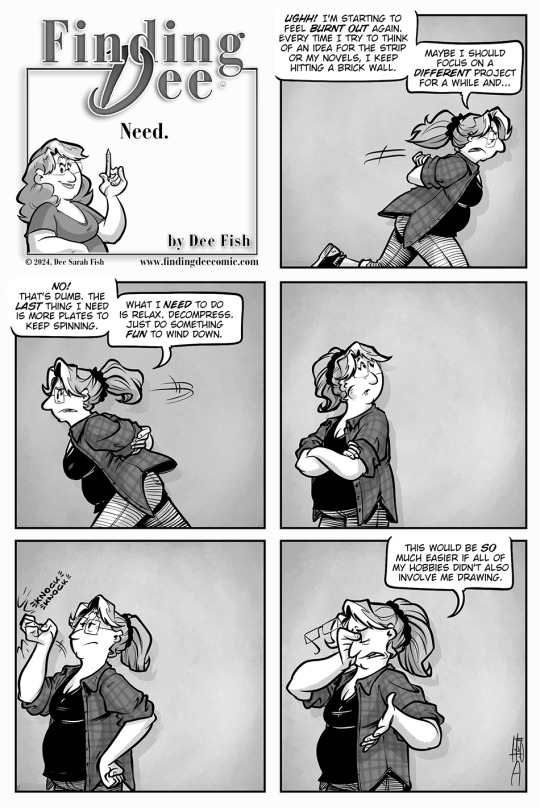
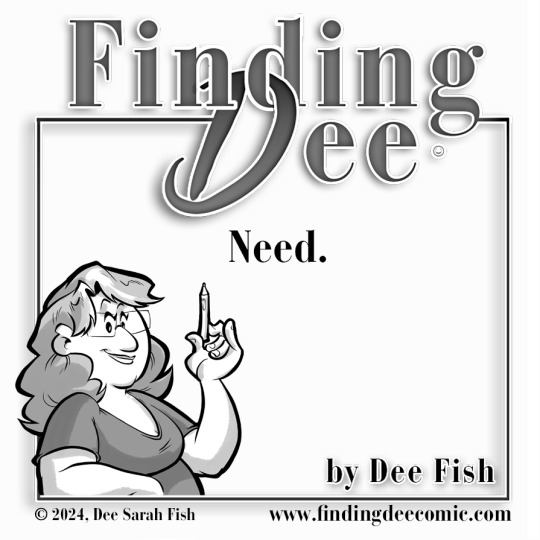
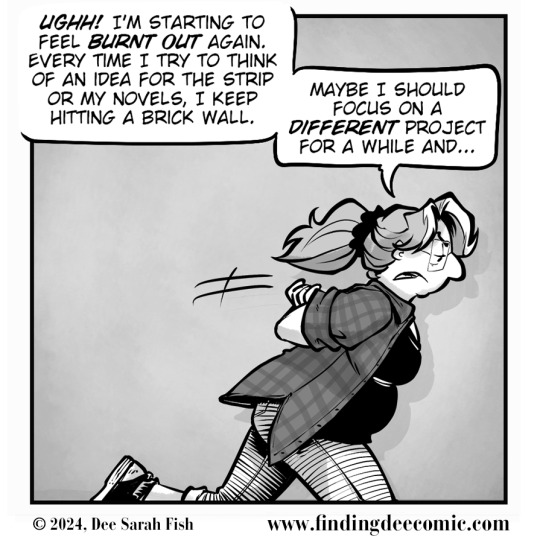
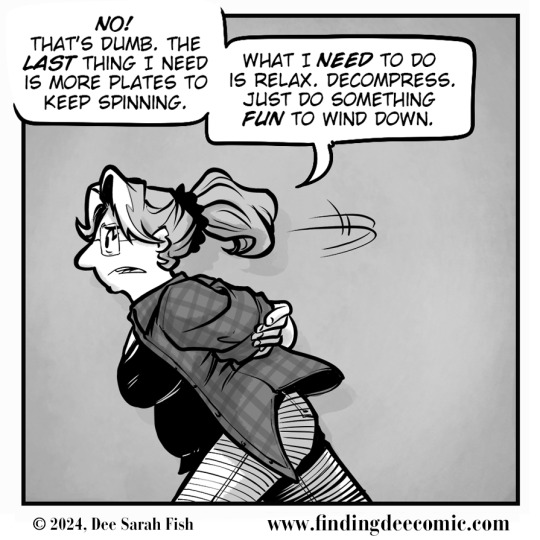
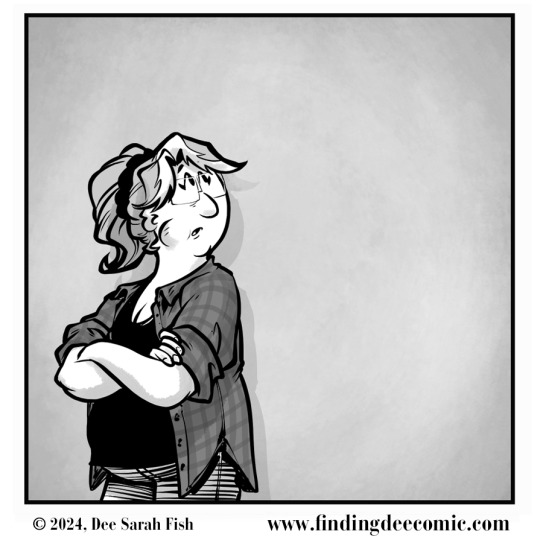
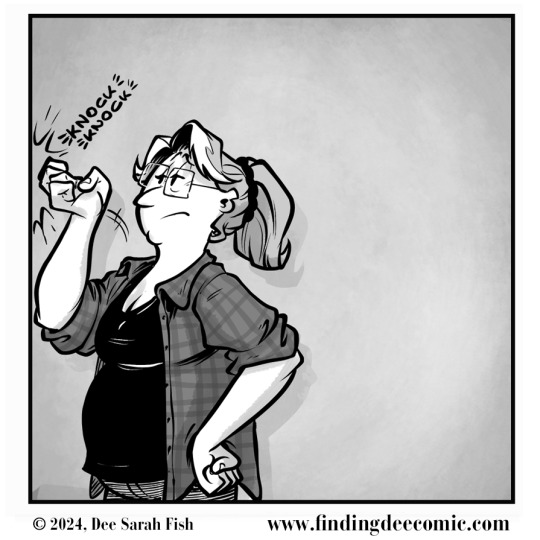
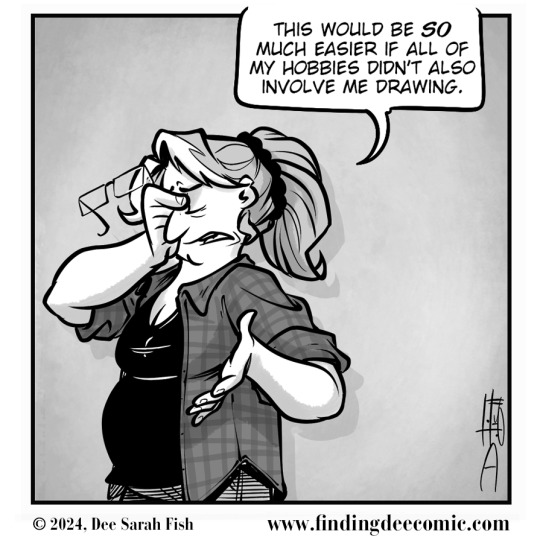
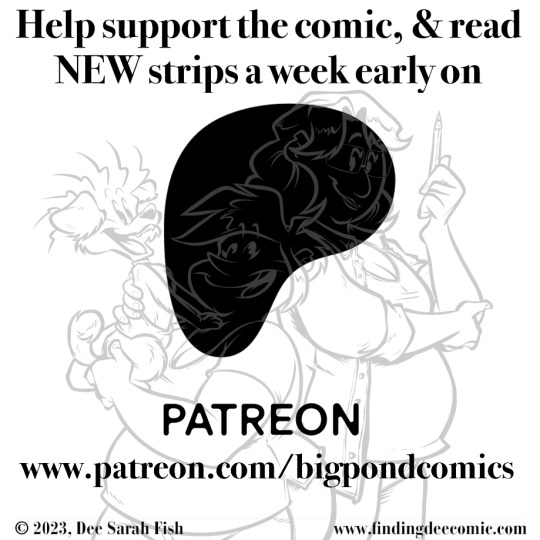
So, this strip isn't REALLY about burnout. I mean, I deal with that problem all the dang time and that fear did INSPIRE the ideas, but this is actually the beginning of what I'm hoping will be a pretty fun story arc.
The fact that I'm literally knocking on the panel border might be a clue as to where this is heading for some of my long-term fans. Hope you enjoy.
#burnout#burntout#overwork#overworked#breaking the fourth wall#hobbies#drawing#stressed#lgbtq comic book heroes#lgbtqcomic#transgender#webcomic#comic strip#lgbtq
58 notes
·
View notes
Text
I love El Goonish Shive because you can have a talking stage-magician's wand which was created to teach people magic, and which doesn't understand that people don't have "purposes" the way it does, and then it learns that a character who is Very Autistc has been pulling all-nighters researching stuff, and drops everything to teach them the Japanese word "karōshi", meaning "death from overwork", as a way of convincing them to Stop Doing That. and then you scroll down look down at the author commentary, and the author is like "Yeah, I learned that word from the anime I've Been Killing Slimes for 300 Years, the first episode got me to stop staying up past sunrise to work on the comic and then getting out of bed 3-4 hours later to immediately continue working on the comic."
like I need you to know that this is not a hypothetical example or an exaggeration. I am describing something which literally happened, today.
#shenanigans#canon shenanigans#philosophy#el goonish shive#kevin egs#kevin the wand#tedd verres#autism#brain stuff#dan shive#I've Been Killing Slimes for 300 Years#overwork
56 notes
·
View notes
Text
"We live in a time of crisis. Consider three interwoven ones.
First, climate change. Every year brings more forest fires and less breathable air, the result of an economic system predicated on burning fossil fuels and working long hours to fuel energy-intensive consumption.
Second, overwhelmed families. Even though people in the Global North live in the richest societies the world has ever known, the majority still find themselves overworked and overwhelmed. Practically every family, especially with young kids, is stressed and strained, struggling to balance the unbalanceable demands of care with no support and work with no flexibility.
Third, millions of poor and working-class people are profoundly unfree in that they have no time for anything but the constant scramble to stay ahead of the bills. In Europe, the average woman in a couple with children works a massive seventy-one hours per week when you include her unpaid care labor. In New York, a single mother on minimum wage would need to labor for an astounding (and impossible) 117 hours every week to meet her basic needs. We live in an epidemic of time poverty, where compulsory overwork defers dreams and crushes aspirations under the relentlessness of Sisyphean toil.
Imagine, for a moment, a different kind of society where the standard job was part-time, but also a good job, offering decent pay and benefits as well as flexibility and career advancement. Public provision of essential services would provide a background of economic security: from health care to childcare, pensions to transit (and, ideally, a basic income as well). With their basic needs met, individuals wouldn’t have to rely on their jobs nearly as much to get by — and working substantially less than forty hours would be something to be desired rather than feared.
The Research on Part-Time Work
Recent scholarly evidence shows that slashing work hours is key to confronting climate change. For example, Jonas Nässén and Jörgen Larsson find that “a decrease in working time by 1% may reduce energy use and greenhouse gas emissions by about 0.7% and 0.8%, respectively.” David Rosnick and Mark Weisbrot find that if the United States were to slash its working hours to Western European levels, energy consumption would drop by 20 percent. The most rigorous study to date is probably that of Jared Fitzgerald and colleagues, who performed a longitudinal study on fifty-two countries. They confirmed the results of other studies that more working time leads to more energy consumption, and that this relationship is intensifying over time for both rich and poor countries.
We know that under regular conditions, capitalist economies grow and grow, but so far only by producing more and more emissions. Global emissions have only fallen four times over the last sixty years — 1981, 1992, 2009, and 2020 — precisely when the world was in the throes of economic recession. This is the cold reality of neoliberal capitalism: it forces us to choose between environmental destruction or the social misery of mass unemployment.
Good part-time work offers us a structural escape hatch — a new model to immediately reduce emissions without putting people out of work.
Of course, part-time work isn’t enough by itself. A pro-worker climate agenda must also include national and global agreements on carbon caps, a Green New Deal that unleashes massive state investment fueling decarbonization (for instance, shifting toward clean energy and building new public transit infrastructure), and so on. But good part-time work is a necessary, if insufficient condition, for preventing ecological disaster.
In terms of work-life balance, the evidence is even stronger. The academic literature finds again and again that bringing down work hours alleviates family stress and strain. To cite one of many examples, Rosemary Crompton and Clare Lyonette report in a 2006 paper that in every one of the five countries they studied, “working hours were the most significant predictor of work-life conflict.”
We also know that free time is foundational for individual freedom. To live the life one wants, free time is essential to devise and accomplish any of one’s life goals. One cannot be deeply engaged with family, friends, art, activism, sport, music, education, or any of the variegated projects that animate people’s aspirations if one is always on the clock.
The US vs. Western Europe
For hundreds of years, a vibrant strand of socialism has aspired to build a world with substantial freedom from toil — a world where machines do much of the work so humans don’t have to, freeing us to pursue our aims, develop our capabilities, and flourish in whatever directions we see fit. This is a world where artificial intelligence and robots actually make human life better and easier, rather than ushering in unemployment, fear, and inequality.
But is good part-time work really possible?
For those of us living in North America, part-time employment usually means poorly paid and precarious, with few benefits and even less autonomy. However, there’s nothing inevitable about this. Western European examples show that it’s completely possible to transform crappy part-time jobs into good, secure jobs.
In Denmark, for example, part-time work is usually good work. Whereas the hourly wage gap between full-time and part-time women is more than 20 percent in Italy, Spain, and the United Kingdom, in Denmark, it is about zero. Danish part-timers also enjoy robust benefits and pensions; a person who works part-time at 75 percent for ten years then full-time for the rest of their career, will end up with a pension worth 98 percent as much as someone who worked full-time their whole career.
A single mother working at the lowest wage (there is no official minimum wage in Denmark, since wages are set through collective bargaining) for thirty hours per week earns €27,600, while the living wage is roughly €15,000. Danish part-timers appear to be very happy with their situation. The percentage of part-time women who say they are “dissatisfied” with their job is only 4 percent, and the percentage of part-time workers who are dissatisfied with their life as a whole is just 0.4 percent.
The Netherlands is another illuminating example. It is the world’s first so-called “part-time economy,” with the highest proportion of part-time jobs in the world. Amazingly, close to 50 percent of the entire labor force works part-time (compared to only 18 percent in the EU27).
Since implementing the Equal Treatment (Working Hours) Act in 1996, it has been illegal for Dutch employers to discriminate between full- and part-time workers in the provision of pay, benefits, holidays, and employment opportunities. Part-time jobs are mostly open-ended contracts, not a precarious form of nonstandard employment — part-timers are not significantly more likely to work unsocial hours like evenings, nights, or weekends — and the country boasts the highest proportion of firms in Europe with part-time positions at high levels of qualification (47 percent). The result is that the gap between hourly part-time and full-time wages is only about 5 percent, with very little part-time work being involuntary (only 5 percent of female and 10 percent of male part-timers would prefer to be full-time).
Crucially, the cluster of policies boosting part-time work exists against a background of relatively robust economic security. The country’s National Old Age Pension guarantees every citizen a flat-rate pension by sixty-five, regardless of previous employment or earnings. A living wage for a single mother in the Netherlands is today about €15,000, whereas her income from working thirty hours per week on minimum wage is roughly €19,000. A family with two adults, both working thirty-hour weeks, earns a median income of roughly €60,000 — easily surpassing the living wage floor for the whole family (two adults, two kids) of €43,000. Part-time work, in other words, is perfectly feasible for everyone.
Things could hardly be more different in the United States.
In California, a living wage for a four-person family is roughly $110,000. If both adults worked part-time (thirty hours per week) the family would take in a median income of just $70,000. If part-time work is unattractive for the bottom half of the population, the situation is far worse for the poorest. A single mother in Los Angeles working thirty hours per week at a minimum wage job will bring in only $24,180 — pitifully short of a living wage, which for such a family is more than three-times greater, at over $80,000.
The reason the living wage in the United States is so much higher than in Europe is because social democratic welfare states provide their citizens with free or subsidized health care, childcare, transport, housing, etc. The amount of private money that anyone needs to acquire their basic needs (the “living wage”) is therefore much less. A good life based on part-time work is completely feasible in many parts of Europe.
Germany is another example. Although the country has many fewer part-time jobs than the Netherlands, they have done an excellent job of shrinking the number of hours worked in standard full-time jobs. Germany currently has the shortest working hours in the world — an average of 1,341 a year — which is, remarkably, 26 percent, or the equivalent of eleven full working weeks, shorter than in the United States. In Berlin, a living wage today is about €15,000 — within reach of anyone on a part-time income, since even a minimum-wage part-time worker makes €18,720.
A Transformative Demand
The bottom line is that constructing an economic system where part-time jobs are both good and widely available is possible. Doing so requires the standard social democratic tools of unions, high taxes, and progressive governments willing to regulate the market on behalf of workers. None of this is easy to achieve, particularly in countries with as weak a labor movement and as powerful a business class as the United States. But political will, not technical feasibility, is what is standing in the way of a good life for the majority.
In these times of crisis, it is easy to feel dispirited and hopeless. And when hope departs, cynicism grows. The vision of a freer society built around good part-time work is one antidote to such cynicism. It is a bold, feasible demand — at once radical and realistic in the medium term. The elements that are required already exist in various places around the world.
The result would not be a utopia. It would not solve all our problems. But it could transform our lives."
- Tom Malleson, from "We Should All Be Working Part Time for Full-Time Pay." Jacobin, 22 November 2023.
#tom malleson#quote#quotations#work life balance#leisure#economics#democratic socialism#overwork#adulting#climate change#climate crisis#capitalism#jobs#neoliberalism
45 notes
·
View notes
Text
Guard Dog
Eliot
CW/TW: conditioning, overwork, exhaustion, pet whump, BBU/WRU. Eliot meets Jonas. Character development.
It’s exhausting to clean a whole house by himself. Sir-Nikolai’s house is smaller than his old owners’, but still big.
He needs to stop frequently.
Sometimes he closes his eyes for a moment, after closing a closet door behind him. An empty closet, all the carpeted floor space for him to lie down on and rest. Just for a minute.
He wakes up with the Guard Dog above him, looking. He scrambles to get to his feet, but his legs don’t cooperate. He only makes it to his knees.
“I’m sorry, I’m sorry.” Rest is earned by work, 704. Do you think you’ve earned it? “I didn’t mean to-to fall asleep. Please don’t tell Sir—“
“Sir? Does he make you call him that?”
He wants to hide from the anger. He wants to hide. If you’re noticed, you’ve already failed. But he’s trapped, the closet wall at his back, the Guard Dog-Jonas, his name is Jonas-blocking the door.
“No-no, he doesn’t.” You can call me Kolya, if you want. “But, but he’s an owner.”
“He’s not your damn owner.”
He wraps his arms around his knees, drops his head down, tries to make himself smaller. If you can’t do better, you’re only useful as Guard Dog bait, 704.
“Hey, hey, it’s okay.” The snarl is gone, Jonas’ voice is soft now. “I’m not mad at you. Nikolai just doesn’t think sometimes. Why were you sleeping in a closet?”
“I didn’t mean to sleep. Please—“ He can’t breathe. Grey static creeps up at the edges of his vision. Then, darkness.
He wakes up in Sir-Nikolai’s bed, not sure how he got there.
“Sometimes I don’t think either. I’m sorry,” Jonas says. “I didn’t mean to scare you.”
Eliot nods.
It’s easier to breathe after Jonas leaves the room.
But he’s soon back, carrying a tray with butter toast and a glass of orange juice. Sick food, his mind supplies from somewhere.
Eliot sits up, and Jonas places the tray over his lap.
“I don’t think you’ve eaten at all today.”
The toast is soft and hot, the butter melting and sweet on his tongue. He finishes both triangular halves, and sips at the orange juice. Jonas smiles, showing disconcerting fangs.
“Thank you, Si-Jonas.”
He shrugs. “You don’t have to clean here, you know. Nikolai hires a service to come in twice a week. And-and you can sleep anywhere. It just worried me, when I didn’t know where you were.”
“I’m sorry.”
“You-don’t need to do that, either. Apologize, I mean, for everything.”
“It’s hard, not to.” It hurts, not to, muscles tensing, throat closing, heart racing. The first and last words out of your mouth needs to be “I’m sorry”, because you’ve been noticed, and if you’re noticed, it’s because you fucked up.
“I know.”
Forgive and Forget taglist: @whumpsday @painful-pooch @whumpinggrounds @justplainwhump @bluetheautisticrat @i-eat-worlds
Eliot/704 taglist: @kim-poce @fishtale88 @i-eat-worlds @roblingoblin285 @cepheusgalaxy
102 notes
·
View notes
Text
15
Hero watched Supervillain warily as they crossed the room to lounge against the desk in front of them. "What do you want from me?"
Supervillain leaned slightly forwards to look Hero up and down. "You're gorgeous, love, so don't take this the wrong way, but you look like you haven't slept in days."
Only days? Hero had barely slept in months. "It's training." they snapped. "And it's none of your business."
"Training?" They thought they detected a slight tremor in Supervillain's voice.
"It's normal." Hero said. "It's fine. I'm not here so you can save me again."
They smiled humourlessly. "Maybe I wouldn't have to save you if you would do it yourself, but no." They sliced through Hero's binds and tugged them to their feet. "I'm kidnapping you. You're mine now. Go get some sleep."
#NOT A PROMPT#hero x villain#not a prompt#writing#angst#fiction#my writing#villain x hero#fantasy#enemies to lovers#idk#angst angst angst#fluff#hero x supervillain#supervillain x hero#overwork#overworked hero
460 notes
·
View notes
Text
when the parent figure/team leader of the team is also in charge of other, smaller and more secret teams, and leaves the main team for long stretches of time.
the child figure/youngest waits for them to come back, but every time they do-for just long enough to eat a warm meal and crash in their own bed-they return more exhausted and battered-looking than before, and barely have the time or energy to explain to the child that these missions are top-secret and they can’t tell them anything about them.
until one day, leader ends up in the hospital/goes missing and the team returns without them.
65 notes
·
View notes
Text
I keep wanting to say 'i'm sooo sorry I'm such a failure I haven't been working on the comic project more even though I said I would' but then I remember I've been forced to work 45+ hour weeks in 115F for a month now and I'm like 'oh yeah never mind.'
#overwork#millennial life#corporate american hellscape#writer problems#creating black magic#anyway gonna go animate some more character art now before I gotta go back to work#life of a texan peasant#yee yee
46 notes
·
View notes
Text
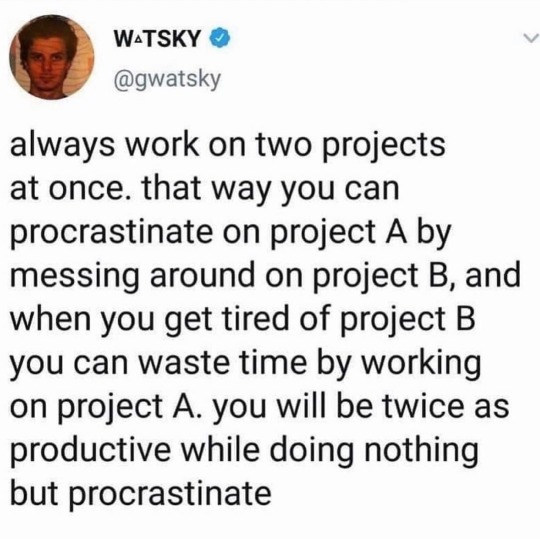
Always work on two projects at once. That way you can procrastinate on project A by messing around on project B, and when you get tired of project B you can waste time by working on project A. You will be twice as productive while doing nothing but procrastinate.
#ideas#my screenshots#screenshot#thoughts#life#change#mindset#growth#meme#humor#procrastination#projects#overwork#focus
15 notes
·
View notes
Text
my brain hurts so much 🧍♂️
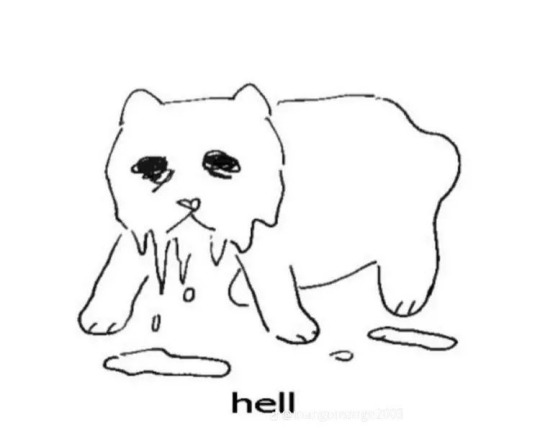
57 notes
·
View notes
Text
@febuwhump Day 5 - Rope Burns
This one features... an AU that we're worked on for a while now over on @mantisgodsaus. You guys like selkies, right? We have more of those.
There is a rope tied around his neck.
He walks, aimless and uncertain. His mouth is dry, his gait is slow.
The fog coating his brain isn’t normal. Isn’t natural. He can feel it dragging at the corners of his brain, lagging, tearing, threatening to draw him under. He resists it as best he can, but he knows that there are things he has lost, even with his best efforts.
There is something that he has to do - some goal, some need- but he can't remember what it might have been now. There is a distinct sense of purpose dogging at the back of his mind, a need to find, a need to continue, to keep going, to move forward no matter what-
But he can't remember what it is.
He continues.
There is a rope around his neck, rubbing at his skin with every step. Maybe it's tied too tight. Maybe it's tied too loose. He can barely breathe with it on, and yet, he can't imagine trying to go on without it. It chafes, chafes, chafes, and he ignores it best he can, trekking forward with single-minded certainty.
He has to do something. He has never been more certain in his life about it. He has to do something, and he cannot delay. People are relying on him.
There is a rope around his neck.
He has a name, but he cannot remember it. The burning, chafing, scratching around his neck does not allow for it. His mind dulls, his paws shake- but he cannot abandon this path, not when he is still needed.
There is a rope around his neck.
Exhausted, tattered, and near ready to drop, the only thing that keeps him moving forward is sheer, raw, force of will.
His paws bleed out lifeblood into the unforgiving sand. His tongue grows dry and cracked, the heat of the desert ravaging his throat until he struggles to breathe. His chest heaves with the effort of walking- in, out, in, out, the mucus of his throat hardening until each breath clogs his windpipe more with bloodying foam.
He cannot stop. He cannot falter. He cannot allow himself to break.
And yet, every breath is harder, more of a pained wheeze than the last, more likely to trap itself in his throat, to force him into fits of coughing and heaving before any capacity to move forward. His momentum is slowly beginning to peter out, sense of purpose failing to propel him out from under the weight of his own body's failure - he moves, but he cannot keep himself going forever.
There is a rope around his neck.
Even through the fog about his brain, it feels like a failure. He stumbles on half-numb paws, particles of sand trapped and abrading in his wounds, and he seeks somewhere- anywhere- to shelter.
There is a rope around his neck.
It has been entirely too long since he has seen a place to den. Longer, still, since he has tasted water. The Lost Sands are hot and endless, still, and loose sand makes for poor shelter. Soft soil, deeper tunnels- something in him cries for him to dig as deep as he can, but even in his delirious state, he knows that he will find no purchase in the sands like this.
There is a rope around his neck.
His strength is beginning to wane when he finally finds it - a dip in the ground, hidden beneath a structure that he knows and does not know all at once. He tries to remember what it is that makes it so familiar, but his head is tired and his thoughts clouded - it is a doomed endeavor from the start, and he is forced to abandon the train of thought, simply limping forward, seeking out the blessed, cool darkness beneath.
There is a rope around his neck.
It burns unpleasantly against his worn-open throat, the wound pulsing erratically beneath it, but he ignores its cloying grip. Something about the darkness calls him- the deep depths of the earth holding a siren's song that he struggles to refuse. He struggles to move forwards, but his paws refuse to obey, threatening to give out beneath him- his body is sore, his throat raw.
There is a rope around his neck.
His limbs fail him.
The siren song calls him ever more, singing, humming in his ears without rest- but his body cannot move another inch, drained of all strength. He must keep going, he must- he has his duty, he has his family, he has the call- but he finds he simply cannot force himself to move another inch.
There is a rope around his neck.
He lies still in the cool earth's grasp, and he waits.
[break]
He wakes to find himself with company.
A shape looms over him, its features indistinct in the earth-encased gloom. The mugginess encasing his thoughts slows his reflexes such that he struggles to respond in time, flailing uncoordinatedly at whatever he can reach. It stands on two legs, two great appendages on its back like fine-furred cloaks as it snatches its hands from his neck - he knows that he is familiar with its kind, but he cannot recall how, nor what it might be.
Their touch only hurts all the more, and he bares his teeth at it, bloody saliva gurgling in the back of his throat. The beast recoils at sight of him, hurrying to the far side of the dirt-den, a scent of fear and worry seeping from it- it is only luck that he might have remained well enough to intimidate it, and he growls and snarls and thrashes until it flees.
Slumber has given him some strength back, although in many ways he feels worse than he was before. It is enough to lift himself from the ground, however temporarily - to stagger deeper into this temporary den.
The cry of the song in his ears has lessened, though it has not entirely stopped. He drags himself deeper, deeper, ever deeper, as far deep as he can before the darkness at the edges of his vision creeps too much to walk. This den is frustratingly shallow, so much so that he can hardly hear the cry- but his paws are too cracked to dig without harming himself further, and the lure of darkness only calls closer the more he attempts to dig.
He lays on his side, exhausted and spent. His paws ache; his muzzle feels cracked and broken, like mud baked in the sun for too long. He cannot breathe without struggle, his breath whistling through his muzzle like the sound of an all-too-familiar alert. He is exhausted, and he can barely force his eyes open, much less force himself to continue moving.
He is so tired, he nearly fails to see the figure returning.
There are two this time - the one he saw before, small and frail, and a larger one, massive and bulky. They are barely feet away from him when he finally sees them - a movement in the darkness, forcing him to twist his head before he can fully see them as he forces himself back onto his paws with the force of sheer adrenaline.
The figures come closer, and closer- he snarls at them, opening his jaw wide and flashing his teeth. The taller grabs the rope, and he chokes, useless paws scrabbling at chitin as she twists him to the ground, as a pair of tongs close around his rope, as it uses a hammer to-
Clarity.
All the runes etched into the binding light up a blinding blue in the instant before it breaks. He can feel his skin scorch around it- a horrible sort of heat, so strong that it nearly steals the breath from his lungs, but the pain is overcome by the feeling of the fog lifting.
He staggers at the sudden loss of the chains, his paws abruptly feeling all too unsteady beneath him- the enchantment is almost disconcertingly strong, and he struggles to adjust to its abrupt absence as the rails on his mind fall away. His mouth feels dry, his neck burns like it's been flayed open, he feels with a dreadful certainty that his skin has been nearly torn through - but he is himself again.
His first thought, freed from the artificial clouding, is a curse.
Fuck.
How long was he like that? How long was he trapped wandering the desert like an aimless dog? He remembers the rope being tightened around his neck, but everything between and now is a shapeless blur. He takes a moment just to process the sharp feeling of dread that seizes him the moment that he realizes the thought, the fear that he's been too late.
How long was he out?
His first attempt to start the change meets failure- the rope burns around his neck protest, sharply and painfully, aggravated by the shift, and he loses his concentration in an instant. Not good. If damaged too much, he's well aware, the change simply won't take until the damage is healed enough to not gash his throat open, but he can't afford to be trapped as a selkie for so long - not in a conflict like this.
His second attempt is slower, and, thankfully, more successful. His skin splits just below his chin as he forces skin to separate from shell- and he's aware of a sudden, burning pain as his throat rips itself open, rivulets of hemolymph spattering from torn flesh.
He lets go of the attempt, the sides of his pelt fusing again.
That is not a good sign.
How long was he out? How much longer before he'll heal enough to turn back? His tail thrashes from side to side, panic abruptly enveloping him. It's another horrifying moment of fear before he remembers to try and ask those who rescued him.
They've crowded closer during his moment of panic. Concern, he's fairly certain. Astotheles' selkie form cannot speak as a bug could. Fortunately, he's well-versed in workarounds. The utility of those workarounds, of course, will depend on who it is that's found him.
Bandit sign first. His attempt to signal questioning is met with a mere head-tilt, both of the bugs involved muttering amongst themselves. Not his Bandits, then. He scratches a simple symbol into the ground- peaceful meeting[1], only to be met with redoubled confusion, one of the bugs doing what seems to be an attempt at deciphering the components of it.
...most likely not bandits at all.
He brushes over the sign, an abrupt wave of dizziness washing over him. He can't tell for certain if it's due to dread or simply side effect of dehydration - which, arguably, is just as bad of a sign as the hole worn into his neck. It's been entirely too long since he's been a cricket if he's had this long to accumulate thirst. He doesn't recognize the space he's in, but by the lack of bars and total lack of anything keeping him in, he's probably not adding to the list of prisoner cells he's occupied over his lifespan - a small mercy, but still a mercy.
It still doesn't tell him where he is, or where he's been in the intervening time.
A hand tentatively strokes against his side, and he snaps to attention, jerking away from the bug. His selkie form's ears are different from his normal ears - enough so that it can take time to make sense of nearly anything said to him as the sounds echo through cartilaginous outcroppings. The tone, at least, comes across just fine.
Concern is fairly universal.
The larger one offers him a shell filled with... something. He's fairly sure that they're a beetle, by now, though he isn't quite sure - this form relies more on visual cues than scent, and a lot of beetles look more or less the same. It smells like water when he gives it a tentative sniff, and it tastes like water when he tests it - a good samaritan? Or simply fishing for favors?
It matters little, admittedly. The moment he tastes it, he's reminded of just how parched he is, downing half of it in barely a second. He is resistant to dehydration, of course, but he has his limits- he has far more soft tissue to keep hydrated as a selkie than as a bug. He finishes it in record time, licking at the bottom of the preserved shell before it's taken away.
With the water-weight settling in his belly, he is suddenly, vibrantly aware of the fact that he has not eaten in gods-know-how-long.
The smaller bug gestures at him, and he takes a moment to identify it as a common-ish variant of a Moth's sign. Easier to follow than verbal language- his eyes follow movement well like this, in a way he's been told is reminiscent of how mantises follow their prey.
They're asking if he's okay.
He scratches his reply out in Bugnish- "am fine" is not as eloquent as he would like, but he is limited in both space and time here. "need find friends", he scratches out, looking at the beetle and the... probably-a-moth.
Even with a relatively reduced sense of scent, he can smell their incredulity.
He is informed that the moth doesn't appreciate bugs lying to look tough in short order. According to them, he needs food and water and something else first- there aren't really enough moths in his Bandits for him to be terribly well-versed in this particular variant of sign, and he's not familiar with the last one they use.
He is still familiar enough to know what "you agree" looks like.
"cannot wait", he writes. They sign "you agree" with ever-so-slightly more emphasis. Admirable ethic, he supposes, but he still doesn't know how long it's been. He cannot afford to feed himself before his Bandits.
"i go now", he writes. He hauls himself to his feet, intent on marching through the wave of dizziness-
-and finds himself in the arms of the moth, blinking spots of black out of his eyes.
He strongly suspects that he will not win this argument.
He still makes an attempt at protest, pawing at their arms with suddenly-weak claws. They heft him with relative ease, saying something to their partner - he doesn't understand what, exactly, but he gets the gist of the concern. Considering their previous statements... this is not ideal.
He wishes, at times, that his selkie form was a big bigger. This is one of them. He does not have a particularly strong bite, nor does he have any means of utilizing the bite he has. Considering the situation at hand, this is very, very unfortunate for his prospects of finding his Bandits any time soon.
He still squirms as he is carted out of the hollow. He still snarls, making his displeasure known as sharply as he can manage. The rope burns pull painfully with nearly every movement he makes, leaking selkie-red blood all over the moth's front - he cannot quite bring himself to care, in the moment. He has business to do, he has bugs to attend to, he has an organization to run-
And unfortunately for him, none of these facts make him any less trapped in the eyes of a wayward silk moth and his charmsmith girlfriend.
[1] Peaceful Meeting, part of a cant script commonly used among the Bandit groups around Defiant Root. Signifies a place where bugs are to meet for a peaceful meeting - there is also a variant for a meeting where hostilities are to be expected, although it is most commonly used to overwrite the peaceful variant once a meeting has gone sour.
#whump#my posts#febuwhump#febuwhump2024#febuwhumpday5#rope burns#selkieverse#astotheles#butomu#ocs#writing#my writing#dehydration#feral behavior#starvation#overwork#magical bindings#selkies#etc etc yknow how it is#weird dog hours
8 notes
·
View notes
Photo
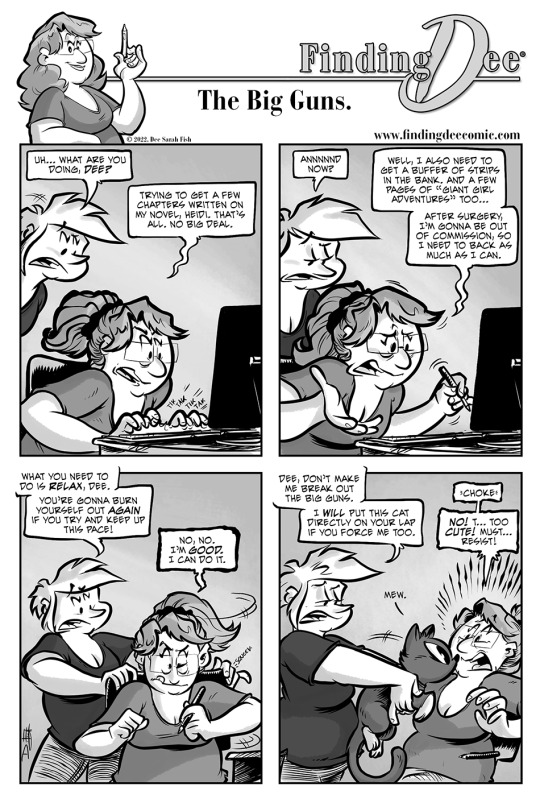
Me and burnout are old bedfellows, so to speak, but I never seem to see it coming. lol
81 notes
·
View notes
Text
Decisions
Also on AO3
@whumptober-archive - day 26: working to exhaustion
@clonefandomevents - Coruscant Guard bingo: Fox's caf addiction
Fox hesitates, mind stalling.
Left or right. Gym or barracks.
On the one hand, he wants to move. He’s just come off a double shift; nine hours at his desk taking calls and completing paperwork, then another nine accompanying the Chancellor as he did the same.
On the other, he wants to sleep. It’s been a long day and a long week and he’s learnt to embrace rest when he can.
Fox hesitates, only kept from jittering out of his skin by the bone-deep exhaustion.
Barracks or gym. He turns towards the messhall.
Caf won’t help, but he’ll try anyway.
#CG bingo#whumptober 2023#no.26#working to exhaustion#star wars#sw:tcw#drabble#overwork#caffeine addiction#commander fox#bingo fill
11 notes
·
View notes
Text
“When the rich rob the poor it is called business” Mark Twain
As if we didn’t know already, the very wealthy expect the rest of us to literally work ourselves into an early grave so they can become richer still. Millionaire Rishi Sunak’s father-in-law, billionaire NR Narayana Murthy is a case in point:
“We need to be disciplined and improve our work productivity. I think unless we do that, what can poor government do? And every government is as good as the culture of the people. And our culture has to change to that of highly determined, extremely disciplined and extremely hard-working people.”
Poor government indeed! Crumbling national infrastructure and collapsing public survives are the fault of lazy working families. If only we would get up off our backsides and put in the 70 hour week Mr Murthy suggests then all would be well.
The arrogance of the super-rich knows no bounds. Working people are already putting in more hours than ever before. People Management had this headline at the beginning of the year:
“More than four million UK workers considering a second job to combat cost of living, survey finds." (09/01/23)
Even during the pandemic, when you would have expected people to be working less hours, that wasn’t necessarily the case. Forbes, the American financial and business magazine had this to say:
“We Worked Longer Hours During The Pandemic—Research Says We Need To Work Smarter, Not Harder… The extra hours worked during the pandemic would be less of a concern if they were just a temporary phenomenon, a blip on the screen. However, overwork is a longstanding problem." (Forbes:18/08/21)
The move to working from home since the pandemic has also led to an increase in hours and workload.
“Employees who work from home are spending longer at their desks and facing a bigger workload than before the Covid pandemic hit." (Guardian: 04.02/21)
And we have this from the BBC:
“Overwork culture is thriving; we think of long hours and constant exhaustion as a marker of success….New studies show that workers around the world are putting in an average of 9.2 hours of unpaid overtime per week – up from 7.3 hours just a year ago.” (BBC:Worklife: 10/04/21)
More recently we had this headline:
“In the current economic climate, Gen Zers are pulling especially long hours – and pushing themselves to the brink of burnout…18-24 (year olds) tend to put in an extra eight hours and 30 minutes of ‘free’ work per week by starting early, staying late or working during breaks and lunchtimes.” (BBC: Worklife: 29/05/23)
So Mr Murthy, people are not sitting on their backsides. They are working harder than ever, often for “free”. What’s more, many have two jobs because you and your rich friends refuse to give them a living wage, because you are more interested in accruing even more billions than you are in seeing working families being paid a living wage.
Rather than lazy workers, it is the greed of the rich and super-rich that has led to the collapse of public services and infrastructure. The system is rigged in their favour, designed for them to escape paying their fair share of taxes. As I quoted in my last blog, “Tax evasion, and, more broadly, tax avoidance, is not inevitable; it is the result of policy choices” and while we have people like Mr Murthy’s son-in-law in charge of government, nothing will ever change.
#uk politics#rishi sunak#Narayana Murthy#super rich#living wage#blame game#overwork#billionaires#tax avoidance#tax evasion#working families
11 notes
·
View notes
Text
Collar
Eliot
CW/TW: collar, pet whump, BBU/WRU, death mention, illness, overwork.
Your collar keeps you safe.
He left his old one behind in his owner’s house, and hasn’t missed it until now. Until Kolya talked about taking him to a doctor.
The other man’s reassurances don’t dent the icy fear that grips him deep in his gut. He loves Nikolai, but nothing he can say can take away the certainty that seeing a doctor means he will be put down as a useless pet.
He tries harder to be useful, and to be invisible. It’s a big house, he can spend all day cleaning it and not be done by dark. There’s only the three of them, Kolya and Jonas and him, they don’t always hear him when the coughing takes away his breath, don’t always see him when he lies trembling on the floor, too weak to move.
He catnaps in the closets, sometimes, secure in the enclosed small dark spaces, unseen.
After enough cleaning, tidying, sorting, he finds a collar. A circle of basic black latex, the collar WRU ships with all their Pets. It feels hardly used. It fits a little too tightly around his neck, sized for a smaller neck.
I’m not an owner. Not anymore.
He wonders who wore this collar before, and what happened to them.
He’s careful not to wear it where the others might see.
Forgive and Forget taglist: @whumpsday @painful-pooch @whumpinggrounds @justplainwhump @bluetheautisticrat @i-eat-worlds @whump-for-all-and-all-for-whump
704/Eliot taglist: @kim-poce @fishtale88 @i-eat-worlds @roblingoblin285 @cepheusgalaxy
37 notes
·
View notes